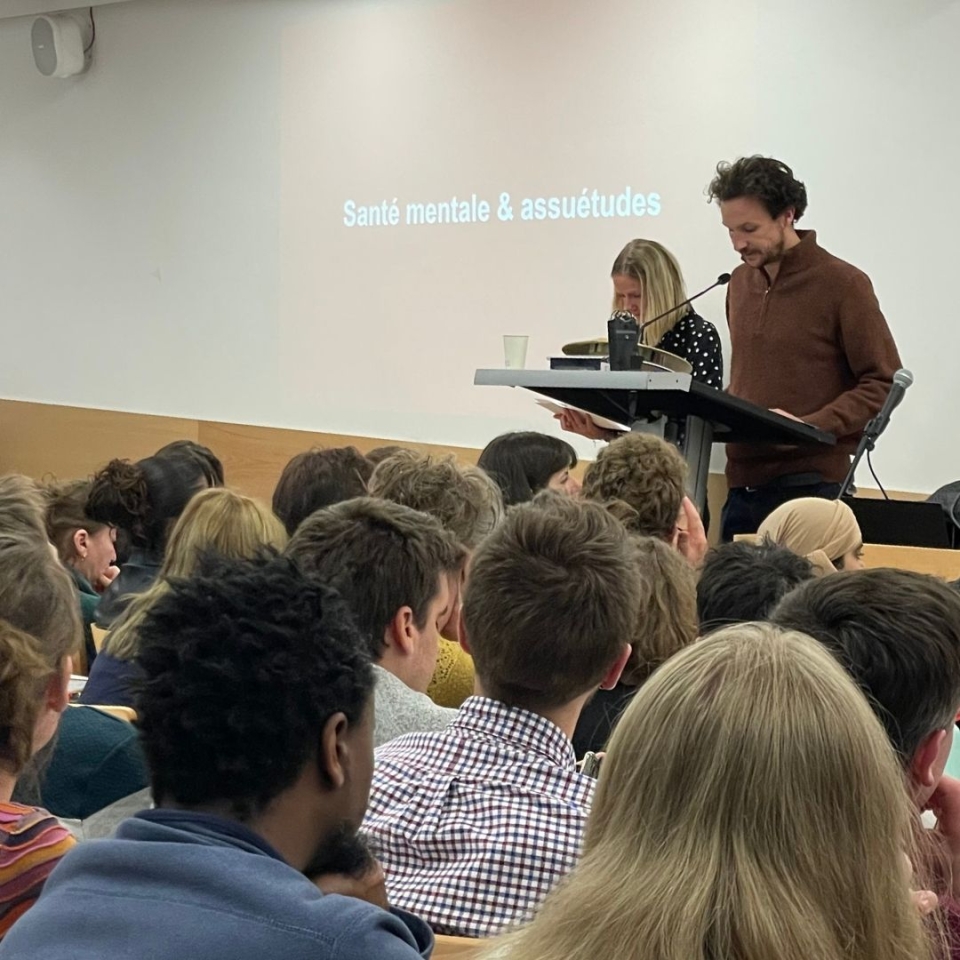On 18 April, the political debate organised by the homelessness sector was attended by various members of the French-speaking parties: Delphine Chabbert (PS), Vincent De Wolf (MR), Alain Maron (Ecolo), Françoise De Smedt (PTB), Christophe De Beukelaer (Les Engagés) and Charles Hosten (DéFI).
Then, on 13 May, the Dutch-speaking debate took place with the 6 main parties: Elke Van den Brandt (Groen), Els Rochette (Vooruit.Brussels) , Benjamin Dalle (CD&V), Sven Gatz (Open Vld), Jan Busselen (PVDA), Cieltje Van Achter (N-VA).
Three themes were addressed in each of the debates: access to housing, mental health and addiction, and migration. Each of these themes is linked to the issue of homelessness. The affordable housing crisis has always affected the most disadvantaged, and now Brussels' middle class is feeling the effects. Mental health and addiction can be a cause of people falling into street homelessness, just as these are issues that can develop as a result of living on the streets. Finally, a growing number of undocumented migrants are arriving in Belgium, and in the absence of a reception solution, they find themselves having to sleep outdoors.
The issue of access to housing
On the issue of access to housing, all parties agree on the urgency of the problem and the need to step up efforts to combat high rents. However, the solutions differed from one party to another: tax incentives (DéFI), compulsory rent controls (PS, Ecolo, PTB, Groen, PVDA), rent allowances (MR, Open Vld) or AIS (Les Engagés), or combating empty housing (CD&V).
Social housing figured prominently in the debates: the MR is in favour of prioritising the most vulnerable people in social housing. The PS called for a quota of social housing reserved for the homeless. Ecolo and PVDA are in favour of introducing a quota of social housing in new builds. Finally, the PTB, CD&V and Vooruit would like to see a revival in the construction of social housing. For Vooruit, this should be done in strategic locations to ensure a mix of housing within a neighbourhood, while Open Vld would like to see more social housing and better management so that households can be housed more quickly.
On the other hand, DéFI, Les Engagés, Open Vld and N-VA do not support social housing. DéFI prefers to opt for incentives to build housing, while Les Engagés prefers to develop the system of Social Housing Agencies (AIS), while maintaining psycho-social support in housing. On the Dutch-speaking side, the Open Vld prefers to subsidise housing allowances, and the N-VA is opposed to laws that prohibit the eviction of tenants, as they believe they hamper investment in property.

The issue of mental health and access to healthcare
this subject has not been addressed in depth on the Dutch-speaking side, while on the French-speaking side, the parties are proposing to increase the number of psychologists in facilities. The PTB argues in favour of housing first because housing helps recovery, and they believe that more psychologists are needed in medical homes. Ecolo believes that procedures should be simplified and harmonised to facilitate access to healthcare. Ecolo and the PS also want to increase access to mental health services. According to Les engagés, mental health services must be given the means by the region.
Addictions
Ecolo is opposed to a security-based approach, which runs counter to the position of several parties in favour of cracking down on the sale of drugs, including the MR, CD&V, Open Vld, N-VA and Groen. Groen and PVDA want to strengthen the services that help drug users, as does the PS, which supports drug consumption rooms and is calling for a "crack plan". DéFI believes that drug addiction should fall within the remit of the Minister of Health, while CD&V goes even further and is in favour of coordination between the various linguistic and local bodies. For the MR and Les engagés, professional support is needed for addicts.
The issue of migration
For the MR and Ecolo, Brussels is home to the majority of undocumented migrants, partly because the other two regions are not dealing with the problem. Both parties agree that the last mass regularisation was too long ago. According to Ecolo and the PTB, some of these people should be regularised. On the Dutch-speaking side, regularisation is less appealing: for Vooruit, regularisation should be based on individual cases and situations, while CD&V does not believe that mass regularisation is the solution. The N-VA proposes a regulated migration system like in Australia, with a selection of qualified candidates, while the Open Vld is in favour of the Canadian model, which opens up migration on the basis of a country's budgetary health.
For Les Engagés and DéFI, this is a regional problem created by the federal government, which is not meeting its commitments. DéFI considers that clear criteria are needed for regulation, particularly for the MENA countries, which are particularly vulnerable, and Les Engagés believes that the solution is to reach 0.7% of GDP to be devoted to development aid in order to prevent the phenomenon of migration. As for the PS, the solution would be to create a regional migration agency.

